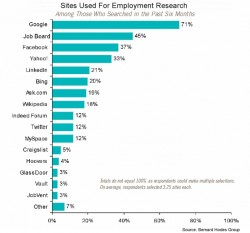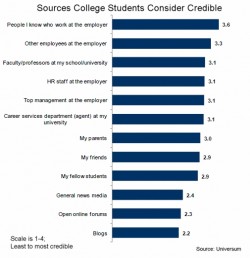![]() A pair of surveys about the use of social media for recruiting shows that while the waters are promising, navigating them is trickier than it might seem.
A pair of surveys about the use of social media for recruiting shows that while the waters are promising, navigating them is trickier than it might seem.
One of the reports, done by Universum, which surveyed U.S. college students on social media, as well as on other means of employer communication, found the company website to be the place where more than half of them look for information. Professional and social networks were not considered as useful, and, in fact ranked behind on-campus career fairs and even job boards.
In fact, Universum says that by a large percentage, college students would rather not be receiving employer information via social networks like Facebook. According to the report, 59 percent consider it “unattractive” to receive information through that site. Business networks, LinedIn for example, are a different story. Ninety-three percent of the students say it’s ‘attractive” to get employer information there.
Does that mean employers can skip Facebook and concentrate just on professional and ![]() business sites? No, says the second report by the Bernard Hodes Group. It found that 52 percent had some sort of employment-related discussion on a social networking site. By far the biggest percentage of them (68 percent) mentioned new job opportunities, while 42 percent had discussed the job search experience or were involved in a discussion about a company’s work environment. Almost 25 percent checked out a potential employer’s social networking site.
business sites? No, says the second report by the Bernard Hodes Group. It found that 52 percent had some sort of employment-related discussion on a social networking site. By far the biggest percentage of them (68 percent) mentioned new job opportunities, while 42 percent had discussed the job search experience or were involved in a discussion about a company’s work environment. Almost 25 percent checked out a potential employer’s social networking site.
 The Universum report doesn’t explain what it means by “receiving employer information,” but it seems reasonable that few would object to the information being there if they were to go look for it. Which probably explains why Hodes found that 37 percent of its survey respondents used Facebook to research prospective employers. (The most commonly used site for research — by 71 percent — was, as might be expected, Google.)
The Universum report doesn’t explain what it means by “receiving employer information,” but it seems reasonable that few would object to the information being there if they were to go look for it. Which probably explains why Hodes found that 37 percent of its survey respondents used Facebook to research prospective employers. (The most commonly used site for research — by 71 percent — was, as might be expected, Google.)
However, having a presence on social networking sites isn’t a particularly strong influencer for the Hodes respondents. They disagreed with the statement that “I tend to be attracted to work for employers that have a presence on social-networking sites.” On a five-point scale with a “5” meaning “strongly agree,” the statement managed only a 2.8.
Curiously, the statement “Social-networking sites provide a great opportunity for networking with others to find new employment” was only somewhat more favorably viewed. It averaged a 3.33.
Because the reports surveyed different groups and asked different questions, it’s not possible to draw too fine a comparison. Universum surveyed college students to help employers find the most effective means of communicating with them. Hodes looked exclusively at social media for employment sourcing, surveying a wide swath of workers from college students with part-time jobs to Boomers and some retired. However, it is instructive that both surveys found personal contacts who work at a target employer to be the most reliable source for learning about the company.
 Universum found that college students consider people they know who work at a company to be the most reliable source of information, followed by other employees, such as those who may be posting to the company site. Hodes says that 46 percent of its respondents consider the information posted by people in their network to be reliable versus 34 percent of those who say the same of employer information.
Universum found that college students consider people they know who work at a company to be the most reliable source of information, followed by other employees, such as those who may be posting to the company site. Hodes says that 46 percent of its respondents consider the information posted by people in their network to be reliable versus 34 percent of those who say the same of employer information.
The Hodes report — as does the Universum — talks about a number of other issues, including that 92 percent of the survey respondents say one or more pieces of information that they consider important is missing from employer career sites. Topping the list: a full description of job responsibilities, followed by career advancement opportunities.
Though I’ve drawn some comparisons between the two reports, keep in mind they were done for different purposes and surveyed very different groups. Still, there are some takeaways that can be generalized from the two reports:
- It’s useful for a company to have a social media presence. Being there lets people find you and decide whether to interact;
- You won’t be judged harshly by most for not having a social media presence, but you will miss opportunities;
- Site appropriateness is important to weigh when deciding how aggressively to source and promote;
- Employee comments and posts are considered credible and if the writer happens to be in the job seeker’s network or there is otherwise a personal connection, the trustworthiness rises. This suggests that companies might encourage employee posts, and, as the following data point from the Hodes report implies, to keep it honest;
- Negative information about a company is not as damaging to recruiting efforts as you might think. Most information turned up during a search was either neutral or favorable and it had either a positive impact or none at all.